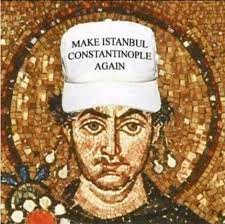|
An important and, indeed, for many of us, very sad anniversary today: the Fall of Constantinople to the Ottoman Turks, in 1453 – 569 years ago today. As a dear friend and brother Anglican priest has noted,
Today in 1453 is the date when the Roman Empire finally fell. It marks the fall of Constantinople to the Ottomans, which became the Capitol of the Eastern Roman Empire when the Empire was split between West and East. History knows it as the Byzantine Empire. But citizens of the Byzantine Empire called themselves and thought of themselves as Romans for indeed they were. GLORIA ROMA ERAT (‘the glory that was Rome’).
Constantinople was the “New Rome,” named for the Roman Emperor Constantine the Great, who proclaimed official toleration for Christianity in 313 AD after seeing a Cross of light in the sky above the sun (he had been a devotée of Sol Invictus, “the Unconquered Sun”) and the words “In hoc Signo vinces” – “in this Sign conquer” – before the Battle of Milvian Bridge (one of his successors, Theodosius, made Christianity the official religion of the Empire in 380).
Constantinople was the last remnant of the Roman Empire, and the last bastion of Christianity in the region, when it was conquered by the Muslim Ottoman Turks.
But what I will always remember from accounts of the last battle is that the night before, all the defenders who could be spared from the walls gathered in the great church of the Hagia Sophia (Holy Wisdom) – both Byzantine Eastern Orthodox and European Roman Christians alike – and heard Mass together, with the Emperor, Constantine XI Palaiologos, and his family.
Then the last Emperor of the Romans, who shared his name with the Founder of Constantinople, led his troops out to defend the City. Though his precise fate is unknown, and his body never recovered, it is believed that he died sword in hand, leading a final, desperate counter-attack against the Ottoman Turks pouring into his Imperial City through the gap blown in the walls.
This leads to a tangential but related point that many who are not students of history may not realize: Muslims have not dominated the Middle East and Asia Minor forever; they are not, as it were, the “indigenous population.” They have no more inherent right to be there than anyone else. Constantinople was a Christian city, since its founding as “New Rome” under Constantine I in c. 331 AD – almost 300 years prior to the origin of Islam – and remained so for a thousand years.
It was the seat of one of the Five Patriarchs of the ancient Church (known as the Pentarchy), along with Jerusalem, Alexandria, and Antioch in the East, and in the West, Rome itself, which has not fallen… at least, not to Islam. The Muslim calendar does not begin until 622, by which time the Middle East had been Christian for centuries! And Muslims may complain about the Crusades, but Islam had conquered these formerly Christian territories with the sword: an important historical fact to keep in mind.
While a sad day for Christendom, both East and West, the Fall of Constantinople did have one positive effect for Western Europe: Byzantine Christians fleeing the Ottomans brought with them many Classical manuscripts which had been lost to the West during what had become known – albeit not entirely accurately – as “the Dark Ages.” This wisdom from the ancient world sparked a rebirth of art, architecture, literature, philosophy, and even the early beginnings of science, which collectively became known as the Renaissance.
But at a terribly high cost…
I ran across this online, several years ago; and although it is tongue-in-cheek, I can’t say I would be sorry to see it!
|



